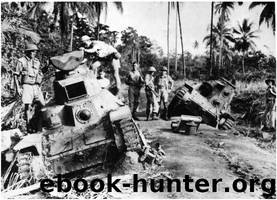Jungle Warfare by J P Cross

Author:J P Cross
Language: eng
Format: mobi, epub
ISBN: 9781783034703
Publisher: Pen and Sword
Published: 2013-05-22T07:00:00+00:00
EARLY DAYS IN INDO-CHINA
Communist Revolutionary Warfare broke out in early fighting in south Indo-China, Cochin-China. The French there were doomed from the very start: this is not said from the comfort and safety of a non-combatant’s chair, or with the benefit of hindsight. I was in Cochin-China from early October 1945 to the end of January 1946 with 1/1 GR to disarm the Japanese. With the atomic explosions of a few weeks before metaphorically ringing in our ears, it was risible, yet indicative of this new type of warfare, that the first weapons we captured were bows and arrows.
The Soviets were meddling in the area even then – indeed, in 1983, when working in the university in Kathmandu, I heard them boast about it. In Calcutta in early 1948, meeting as ‘The World Federation of Democratic Youth’ and the ‘International Union of Students’, Stalin’s new policy against ‘Imperialists in Southeast Asia’ (Andrei Zhdanov’s ‘two-camp’ theme), was relayed to a plenary session of Indian Communist Party, then to that of the Malayan Communist Party, by the Australian Communist Party leader, Lawrence Sharkey. Nothing straightforward in the Communist method of disseminating their plans!
But even earlier still, in late 1945, there was evidence of Soviet involvement. We were sent north from Saigon to disarm the Japanese but the Vietminh actively resisted us. We did not have enough troops to keep the Vietminh at arm’s length and disarm the Japanese at the same time. Accordingly two Japanese battalions, untarnished by any atrocities committed against the Allies, were detailed to help 100 Brigade. Both of them, Yamagishi butai and Takahashi butai, came under the operational command of 1/1 GR at separate times. The Japanese commanding officer had to report in to us once every day. As the intelligence officer I helped my commanding officer, Lieutenant Colonel C.E. Jarvis, with these reports.
One day they announced that they had captured a Russian. ‘Shall we kill him or bring him to you?’ Major Takahashi asked through his interpreter.
‘Bring him to us tomorrow. How do you know that he is a Russian?’ Jarvis countered.
‘Because of his uniform and because he is carrying a jar of coffee.’
The information was given with the quiet dignity of one who talks from a position of strength because what he says is true. We did not follow the logic of the coffee but when the Russian appeared on the morrow he had clasped to his bosom a large glass jar full of roasted coffee beans. He was red-haired and stocky, was wearing khaki drill, with a yellow hammer and sickle emblem on a red background on each lapel, with a similar badge stuck in his khaki forage cap. He was sent south to Saigon on the next convoy; we never heard of him again.
I myself was put in command of the Yamagishi butai when it was ordered into action against the Vietminh. Surrender orders were that were any Indian Army unit to be in the same force as any Japanese force, the senior British
Download
This site does not store any files on its server. We only index and link to content provided by other sites. Please contact the content providers to delete copyright contents if any and email us, we'll remove relevant links or contents immediately.
Whiskies Galore by Ian Buxton(42018)
Introduction to Aircraft Design (Cambridge Aerospace Series) by John P. Fielding(33133)
Small Unmanned Fixed-wing Aircraft Design by Andrew J. Keane Andras Sobester James P. Scanlan & András Sóbester & James P. Scanlan(32804)
Craft Beer for the Homebrewer by Michael Agnew(18248)
Turbulence by E. J. Noyes(8055)
The Complete Stick Figure Physics Tutorials by Allen Sarah(7375)
The Thirst by Nesbo Jo(6946)
Kaplan MCAT General Chemistry Review by Kaplan(6935)
Bad Blood by John Carreyrou(6624)
Modelling of Convective Heat and Mass Transfer in Rotating Flows by Igor V. Shevchuk(6443)
Learning SQL by Alan Beaulieu(6292)
Weapons of Math Destruction by Cathy O'Neil(6283)
Man-made Catastrophes and Risk Information Concealment by Dmitry Chernov & Didier Sornette(6022)
Digital Minimalism by Cal Newport;(5767)
Life 3.0: Being Human in the Age of Artificial Intelligence by Tegmark Max(5559)
iGen by Jean M. Twenge(5418)
Secrets of Antigravity Propulsion: Tesla, UFOs, and Classified Aerospace Technology by Ph.D. Paul A. Laviolette(5373)
Design of Trajectory Optimization Approach for Space Maneuver Vehicle Skip Entry Problems by Runqi Chai & Al Savvaris & Antonios Tsourdos & Senchun Chai(5070)
Pale Blue Dot by Carl Sagan(5012)
